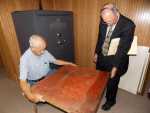Don Rhodes: Working man's lawyer

If prospective clients are looking for a fancy, upscale law office, they don't need to go to the Bloomfield, Mo. office of Don Rhodes. There is no plush carpet, no cushioned chairs or expensive plants. Everything is utilitarian and functional. A farmer can come through the door in his work boots, straight from the field, without having to worry about tracking in mud.
This is a working man's law office.
"We bought the building in 1974, right after Don got his law license," explains wife Sandy. "One section was a laundromat, and the water lines were hooked together. The other owner insisted that the lines be separated immediately. We carried water from the house next door to flush the commodes."

Don Rhodes has worked hard all his life.
"My brother Bill had a service station in Advance," says Rhodes. "I worked for him until I got drafted. When I came home, I worked my way through college. I made $25 every weekend. Back then, you could pay your tuition and live on $25 a week. Tuition was $65 a semester, and that was including books. I paid for rent, food, and gas--all on $25 a week."
Those were the days when the shoe factory in Advance was in its heyday, with 650 workers, the sixth largest shoe factory in the United States. The gas station was busy.
After graduating from college, Don had trouble finding a job.
He had been turned down by one company because he hadn't belong to a social organization in college and another because he had no experience with unions, so he agreed to manage his brother's service station for $100 a week.
He met his wife Sandy in Advance in 1963. She tells the story:
"In 1939, my mom saw Dad get off a bus at Kinder's Drug Store," Sandy Rhodes remembers. "He was singing 'Taxi, taxi!' and she thought, 'Mmmm, that's someone I'd like to meet!' That's how they met.
Years later, in the same place, I got off the bus from Chicago with my suitcase in my hand. Along came Donald and gave me a ride. The rest is history!"
Don's entry into law school is hardly a typical story, either:
In 1969, Don and Sandy Rhodes had one child and another on the way. They went on a road trip to Mississippi with friends and ended up in Oxford at the Old Miss campus, because his friend wanted to see where William Faulkner had lived. Sunday afternoon, on a whim, Don's friend said, "Didn't you think about going to law school?"
Though Rhodes had previously given up on the idea, he agreed to talk to the director of admissions at Old Miss and fill out an application.
He was accepted.
"So William Faulkner is the reason I'm a lawyer," Rhodes quips, with his usual mischievous smile.
After Don's graduation, the young family had to stay in Mississippi until he took the test for the bar. He needed a job, and there were none in Oxford, so they went to Batesville.
"I canvassed the whole town," Rhodes remembers. "There was nothing. Then, I looked down an alley and saw a sign that said, "D.R. Johnson, attorney at law. It was behind the bank. No one was at the front desk. An 86-year-old man was just sitting in back. I said I was looking for a job. 'Can you type?' the old man asked."
Don confessed that he hadn't typed in 20 years.
"Are you willing to try?" the old guy asked. "I got shingles and need someone to chauffeur me, when I go to check records. My secretary is my niece, and she's 75."
They had a manual typewriter.
"I did his typing, and he showed me how to check the land records," explains Rhodes. "They didn't have abstracts. His office was a little bit deceiving. He owned the bank. He approved the titles to real estate. He had worked at the post office, when William Faulkner was post master."
Johnson's assessment of Faulkner was dim: "He was no good! We called him 'Count No Count," because he would open people's mail, read it, and throw it away. He would read all the periodicals and then throw them away."
Rhodes worked for this eccentric lawyer about five months, and then he came back to Missouri. He and his family had a little building in Advance before they bought their current building in Bloomfield.
Two of his most interesting cases involved a cat and a chicken.
This reporter's late husband was excused from jury duty on the cat case, so it was most interesting to see what he missed!
It seems that, once upon a time, the City of Bernie filed criminal charges against a woman for running over a cat. She hired Don Rhodes to defend her, assuring him that the cat was already dead when she ran over it.
The City of Bernie, however, had witnesses who testified that the woman drove up on the sidewalk to hit the cat.
Rhodes, with his usual sense of humor, thought the case would be interesting to handle, and he asked the woman if she wanted a jury trial.
"Yes, I do!" the woman exclaimed.
When Judge McHaney saw the case on the docket, he was not amused.
"Rhodes, what's this about having a trial over a d--- cat?"
"Yes, don't you think that's hilarious?" asked Rhodes.
"Not very hilarious," said the judge. "You realize what that's going to cost this county?"
"Now, wait a minute," Rhodes said, "My client has been charged with a criminal offense (cruelty to animals) and there are two constitutions that guarantee her a trial by jury."
"What? This is not a small claims case?" stormed McHaney. "Who filed this?"
"Don't look at me, Judge," said Prosecuting attorney Briney Welborn. "I didn't do it!"
"Bernie filed it," Don Rhodes said. "Tom Bishell."
The judge turned to the circuit court clerk. "Make a note: The City of Bernie is going to reimburse the county for every penny it's out!"
Rhodes then found out that the city aldermen had just called the animal control person in to start catching all the stray cats in town, so next morning, he sent Sandy down to Bernie to get the minutes. She had a subpoena with her. Nobody seemed to know anything about the cat situation.
The trial was held, and the jury was out 10 minutes. It was the first case the jury heard.
Rhodes heard a juryman say, as he walked down the stairs, "With all the serious crime we've got in this county, this is all we've got?"
This chicken case is even more hilarious than the cat case. It goes like this:
A chicken rode to work under the hood of its owner's car. She parked her car and entered her workplace. Unbeknownst to her, the chicken came out of hiding, jumped up on another worker's car, and proceeded to scratch it up.
At this point, the insurance agent and the lawyer took action, and a series of rather unusual letters were written.
On May 22, Rhodes wrote: Dear Ms. (agent): "Please supply me with details of this matter. I am interested in the size of the chicken, the color of the chicken's feathers. Is it a hen or a rooster? Where was the automobile at the time the chicken damaged it? Was there a brand on the chicken, indicating that it was Mrs. Jane Doe's chicken? Or a collar with a name tag on it? What evidence do you have that Mrs. Jane Doe owned the chicken? Further, I would like to know if the chicken had a violent propensity or is it just an everyday calm laying hen? Please send me details."
The great chicken debate continued, with the animal in question escaping capture and running amok through the back yards of the city, as the letters flew back and forth between lawyer and insurance agent.
It would seem that the insurance agent finally gave up trying to collect for damages, and the chicken was allowed to peck its way through the city with no more attempts to apprehend it.
A conversation with Don Rhodes inevitably yields more information and stories from the past than can be shared in one session; therefore, NSC readers will have to stay tuned for more details to be shared in future installments.
